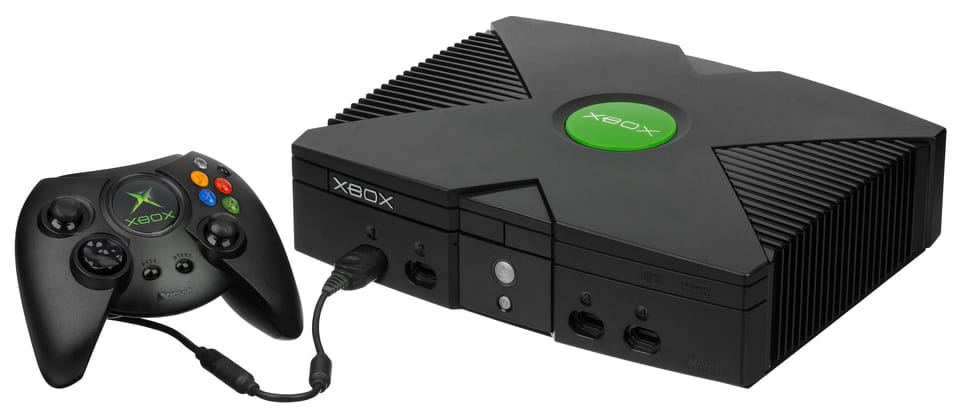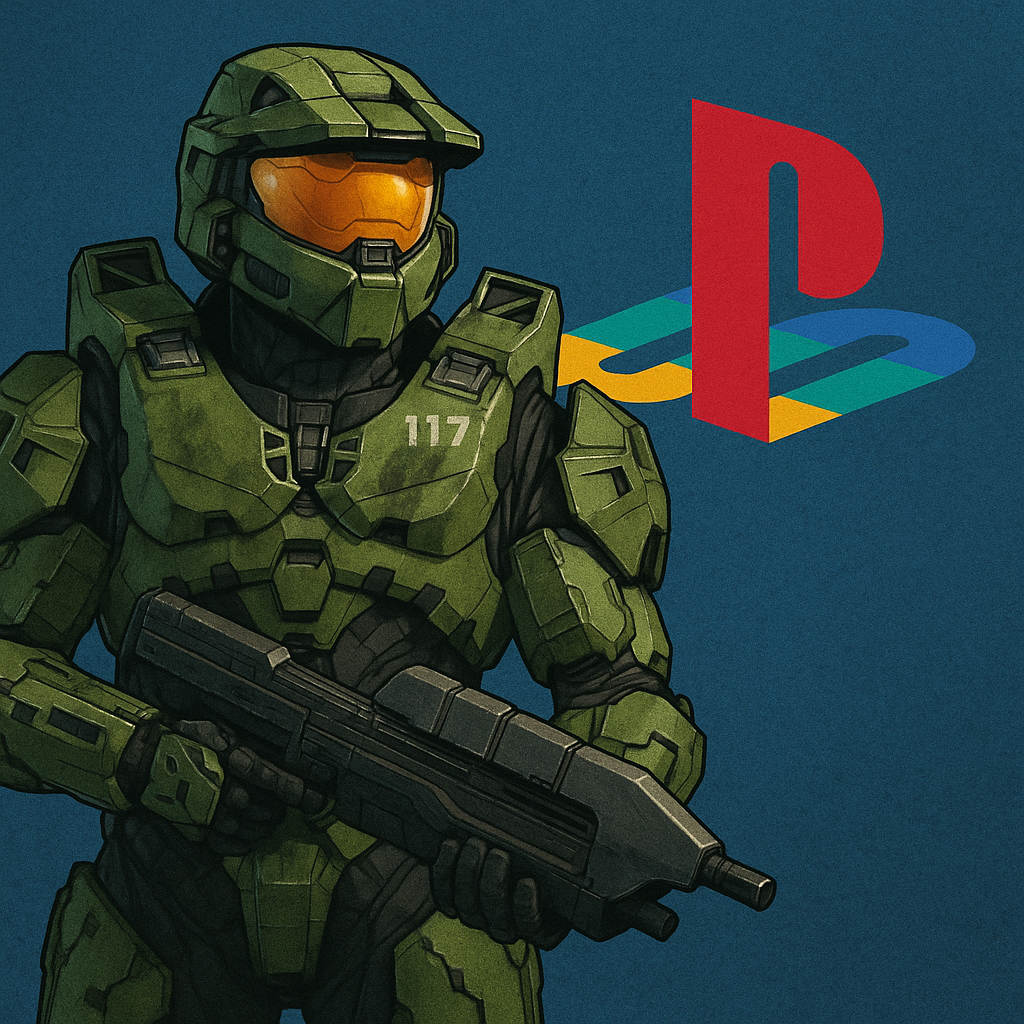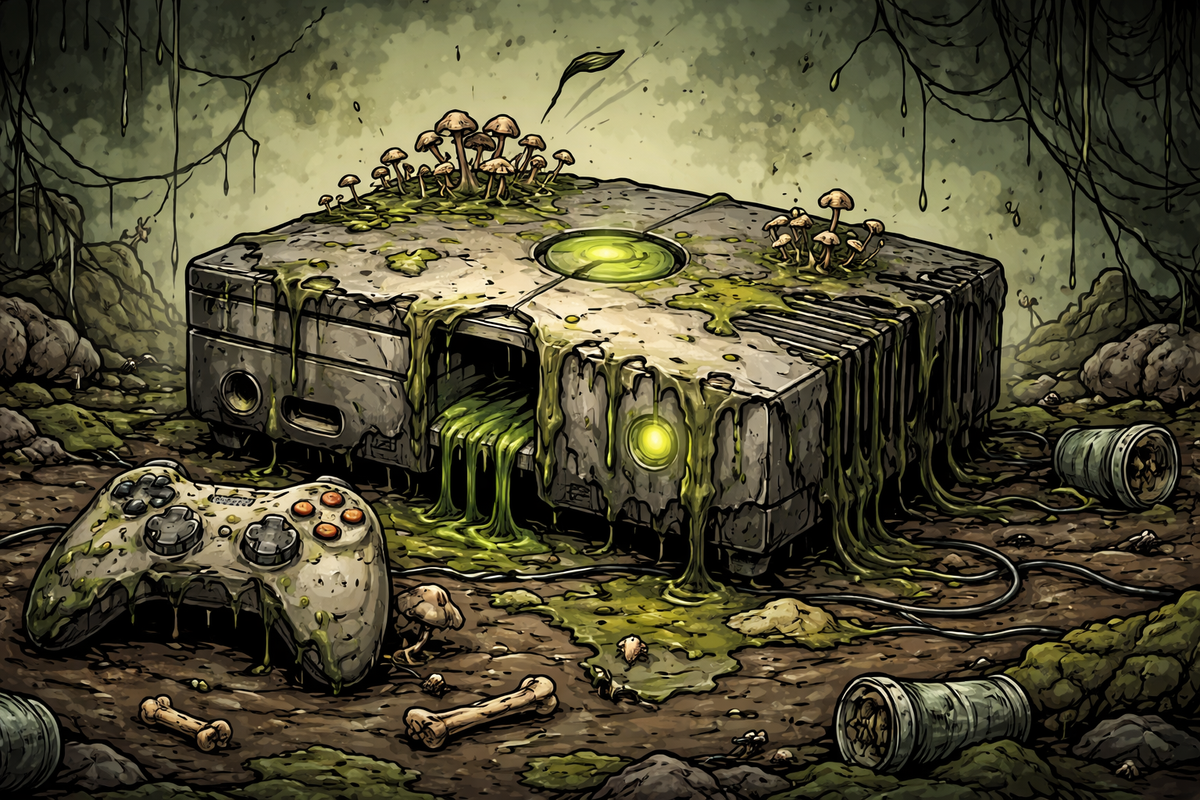Xbox (Every) Where?

The Verge had at least four articles focused on Microsoft's Xbox announcement last week – there's a joke in here somewhere about one for each of the whopping four games they're bringing to other consoles – and upon reading each one, I still can't quite parse what on Earth the strategy is here. That's not the fault of The Verge, that's the fault of Microsoft. Tom Warren's interview with Xbox head Phil Spencer at least tries to ask the right questions. But the answers, as I'll highlight below, are still sort of a mess.
First, the actual news:
“We’ve made the decision that we’re going to take four games to the other consoles,” reveals Microsoft Gaming CEO Phil Spencer on the official Xbox podcast. Bizarrely, Microsoft is refusing to name the four titles, but the company says that two are community-driven games and the other two are smaller titles.
I mean, what is up with announcing this without naming the titles?! There's clearly a reason for this, but whatever it is feels laughable. Either wait until you can announce the titles or just say them. Especially since, of course, leaks are going to get out, as they did – in the very next paragraph:
Sources familiar with Microsoft’s plans tell me the first two titles will be Hi-Fi Rush and Pentiment, followed by Sea of Thieves and Grounded.
Okay great, with the lede thankfully dug up by Warren, let's move on to why, here's Spencer:
The games themselves have just a great opportunity to grow. When you find a successful game that’s working, that’s finding great customers on our Xbox console, on PC, you think about how do I make sure those game franchises continue to grow? We can invest in them, they can continue to thrive and find new customers. The software part of the business is an easier part of the business to grow and scale. It becomes more about access, both how do the bits actually get to the screen and even some business model access.
What jumps to mind here is that Microsoft is perhaps trying to create a sort of syndication model, like has existed forever with television – and is now making a comeback, with Netflix as the clear winner of the streaming wars. So Microsoft can launch a title on the Xbox and once they feel like it has sort of run its course there, they put it elsewhere (other consoles), hoping it finds new life.
Again, this has historically worked well for television content moving into syndication. And there's also a bit of the "windowing" model for film distribution – where movies go from cinemas to rental to cable (or now, streaming) to network TV. But it's also all different because each of the different distribution platforms have very different models, some paid, some advertising-based. This is Microsoft moving a paid-for game to another paid-for game platform. Again, maybe that's closest to streaming services moving their older content over to Netflix in order to find a new audience. The key difference is that Netflix and the other streamers aren't trying to use their content to sell hardware.1 The game consoles are.2
Also quite different than the above, it requires quite a bit of work on Microsoft's side to port these games over:
These are games that originally launched on Xbox. They were Xbox-branded games and we want to see what happens, because going and doing the development work to bring them to new platforms is real work. We want to make sure that the return makes sense. We want to make sure the audience that’s there has an appetite — maybe they don’t.
That's clearly the answer for why they're only doing this with a measly four titles. They have no idea if this is going to make economic sense. It sounds like Spencer basically got a fishing license to go try this out and report back. Which gets at the strategy here. That is, there really isn't one beyond: let's throw this out there and hope it works.
If not, oh well:
But I don’t want to create a false expectation on those other platforms that this is somehow the first four to get over the dam and then the dam’s going to open and that everything else is coming, that’s not the plan today. I also don’t want to mislead customers on those other platforms. We’re launching these four games, and we’re excited about it. We’re excited about the announce and everything else, but we’ll see what happens for our business.
That just feels like a terrible way to go into a new initiative. Microsoft should have more conviction in what they're doing, if they're going to do it. But it almost feels like they're acknowledging that nothing else has really worked to shift the company from the distant third-place player in the console market, so the new strategy now is just "Xbox everywhere" as they put it.
But again, that strategy is a mess, at least right now. They sell Xbox consoles. Xbox Game Pass. Xbox games. And now games for other consoles.
Yes, they've been doing the latter for a while due to acquisitions. And continuing to do that was the key point of the Activision Blizzard purchase. Microsoft already has to keep selling certain titles on other consoles, so now they're just trying it with their own as well, right?
But how will that help Xbox, the console? The answer is that it won't. The best it can do is not hurt it further. And maybe that's the belief since the exclusive titles clearly weren't moving the needle in terms of Xbox console sales anyway. Okay, so why stay in that business? Unclear. Other than in reading between the lines and into the rumors, Warren pushes Spencer towards what they're thinking here:
I will say I’m very proud of the work that the hardware team is doing, not only for this year, but also into the future. [We’re] really thinking about creating hardware that sells to gamers because of the unique aspects of the hardware. It’s kind of an unleashing of the creative capability of our hardware team that I’m really excited about.
That's saying nothing beyond confirming that they're going to continue to do hardware of some sort. So Warren keeps pushing:
Does that involve a handheld? You keep liking loads of tweets about handhelds.
I’m a big fan of handhelds. [Laughs] I’m a big fan, but nothing to announce.
When I look at Xbox and I say, ‘Okay as a platform, how do I know that we’re doing well?’ I look at how many players there are, I look at how many hours get played. It turns out that the number of hours played on a monthly basis across Xbox, across cloud, PC, and console is a pretty good metric for how we’re doing.
So, okay, what keeps people from playing certain hours? Well there’s some sleep, school, and kind of normal life, but some of it is just access. Do I have access to the games that I want to play right now? Obviously we’re kind of learning from what Nintendo has done over the years with Switch, they’ve been fantastic with that. So when I look at Steam Deck and the ROG and my Legion Go, I’m a big fan of that space.
Spencer famously telegraphs things as Warren hits on, and those likes are clearly no accident. His answer all-but-confirms that Microsoft will do some sort of Xbox mobile device – especially if the company feels like it can't launch an Xbox mobile app store on the current smartphone platforms, which Spencer goes on to confirm they feel like they cannot given Apple's proposed DMA changes. So again, it will have to be Microsoft doing their own mobile hardware here. Or teaming up with someone to do it, I suppose. But the clear Nintendo-envy would again imply Microsoft going down this path. One last Xbox hurrah, perhaps.
It also perhaps points to a world in which the next Xbox is only a mobile device, or more likely, a hybrid, sort of like the Switch, which can also be jacked into a TV via HDMI. This would seemingly make a lot of sense. Microsoft has tried and failed for over 20 years to dislodge Sony as the console king.3 It's beyond time to try a new approach.4 And the one Nintendo has taken with the Switch is clearly working for them.
But you know what Nintendo doesn't do? Release their games on other consoles. Sure, they have some mobile games now. But nothing on PlayStation and nothing on Xbox. And it's basically impossible to believe that they ever will. Again, their strategy works. Their IP moves the hardware. This is also what works for Sony. But per above, that hasn't been working for Microsoft,5 so they're seemingly now trying to change everything to know what the right way forward may be. But it's too muddled of a strategy with too many pieces moving at once for there to be much of a path to success here, would be my guess.
I like the fact that we get a mix of things happening with our business. Our business model is not just about hardware sales, it’s not just about first-party game sales. It’s a diverse business model that leads to the business success that we’re seeing today, which I think is kind of a testament to the path that we’ve been on for the last few years.
Yeah I mean there's nothing else to like or not like, that's the business Microsoft has made for itself, which they're now altering again, so that's not saying much. You have to believe that Spencer would like it even more if Xbox were in PlayStation's position. Obviously! As for that "business success":
Xbox is our gaming platform and content business. It’s the number one consumer business that Microsoft has. I think you might have commented on looking at last quarter’s earnings, we’re now with the third largest [business] in the company.
That's fairly misleading since it only just became true thanks to the aforementioned deal to buy Activision Blizzard – a deal which cost Microsoft $69B. In other words, Microsoft just paid their way into making gaming their third-largest business. And the strategy to keep it there and growing seems to be to try everything and see what works.

Update October 26, 2025: Some new thoughts nearly two years on...

Update February 24, 2026: A fitting (almost) end, perhaps?

1 Yes, Apple and Amazon sell streaming boxes, but neither are core businesses for those companies and both have pivoted into content after the fact.
2 So maybe the thinking here is that if they can grow the interest in these titles, the sequels could drive console sales if/when Microsoft moves them back to exclusive at launch. I mean, that's probably at least what they're telling themselves here?
3 I might argue their constantly confusing branding hasn't helped either.
4 I continue to be amazed/dumbfounded by the fact that in the era of new smartphone models every year, the consoles get away with new hardware only every seven or eight years. What if Microsoft used their scale to try to change this equation? It would be insanely expensive, I'm sure. But it could push Sony in ways it would find very uncomfortable, I imagine. Game changer, you might say. The hold up, undoubtedly, would be developers. Microsoft would have to create a development framework akin to iOS/Android where the upgrade cycles don't make creating games impossible. But again, if any company has the resources to do this, it's probably the most valuable company in the world...
5 Never stated in all this talk of the "end of exclusives" is that an exclusive is undoubtedly what put Xbox on the map in the first place: Halo. It's why I bought the first Xbox. Same with most of my friends at the time. Microsoft, for whatever reason, hasn't been able to really replicate that early success.


